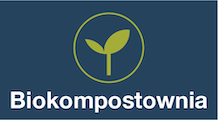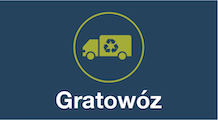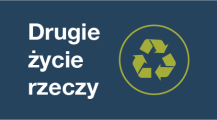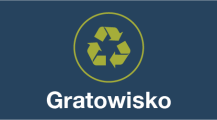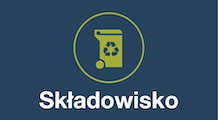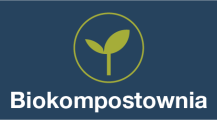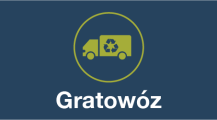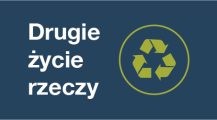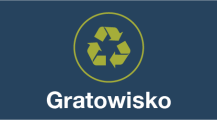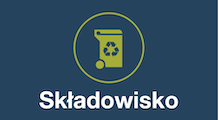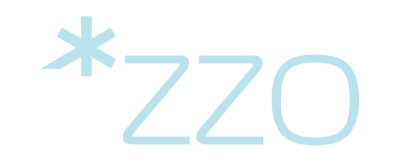
Mobile Point of Selective Collection of Municipal Waste (MPSZOK) is a special vehicle adapted to the collection of selected fractions of municipal waste, which shuttles according to the schedule for a given calendar year in a given commune. Waste can be delivered to MPSZOK by residents of the City of Poznań and residents of municipalities covered by the operational area of Związek Międzygminny "Gospodarka Odpadami Aglomeracji Poznańskiej" (Poznań Agglomeration Waste Management Association). Giving the municipal waste away to MPSZOK is free of charge.
MPSZOK accepts:
- waste electrical and electronic equipment
- batteries and accumulators
- expired medicines from households (can also be delivered free of charge to pharmacies)
- waste came from home injections (used needles, syringes)
- paints, solvents, acids, alkalis, inks, printing inks, adhesives, binders, resins, detergents, detergents containing hazardous substances, photographic reagents, pesticides of the 1st and 2nd class of toxicity, fluorescent lamps and other mercury-containing waste, devices containing freons.
MPSZOK does not accept:
- Materials containing asbestos;
- Waste in amount indicating that it comes from business activities - any waste in bulk (in barrels, bags, boxes containing several bottles of the same waste - capacity over 20 liters per unit packaging);
- Unlabeled waste, without the possibility of reliable identification (no labels), waste, the collection of which may violate the ADR rules (international agreement on road transport of goods incl. dangerous goods);
- Waste in leaking packaging and waste not included in the collection information;
- All waste indicating a non-household source (e.g. chemicals not typical for housework: acids, bases, chemical salts, chemical reagents, except fixatives and photographic developers) - especially in large amounts;
- Bulky waste;
- Construction waste;
- Tires;
- Biodegradable waste;
- Mixed municipal waste;
- Paper, glass, plastics.
It should be remembered that waste that requires packaging must be placed in sealed, i.e. non-leaky and undamaged packaging and it must have original information (label) to make the waste identification possible at the time of transfer.
Warning! The company's employee has the right to refuse to accept the waste, if it would be against the law and could pose a threat to human health or life.

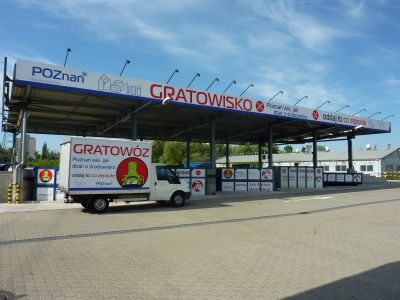
The company runs 3 Selective Collection of Municipal Waste Points:
- PSZOK at ul. 28 Czerwca 1956r. no. 284
Phone: 61 833 22 12
Monday-Friday 8:00 am to 5:00 pm
Saturday 7:00 am to 2:30 pm - PSZOK at ul. Wrzesińska 12
Phone: 61 611 08 11
Monday-Friday 8:00 am to 5:00 pm
Saturday 7.00 am to 2.30 pm - PSZOK at ul. Meteorytowa 1 Suchy Las (landfill site)
Phone: +48 61 811 96 67
Monday-Friday 7:00 am to 8:00 pm
Saturday 7.00 am to 2.30 pm
Types of waste accepted by PSZOK
The following types of waste are accepted free of charge from inhabited real estates:
- Paper
- Metal
- Plastics
- Glass
- Multi-material packaging
- Biodegradable waste with particular emphasis on bio-waste
- Used batteries and accumulators
- Used electrical and electronic equipment from households
- Problem waste with the proviso that the annual limit of the used tires is 4 tires per year
- Construction and demolition waste that is the municipal waste
- Other hazardous waste generated by households (expired drugs, chemicals, mercury thermometers)
- Clothes and textiles
- Waste generated during home injections (used needles, syringes)
- Bulky waste
From uninhabited real estate, PSZOK accepts the following types of waste free of charge:
- Paper and cardboard (including packaging)
- Plastics (including packaging)
- Metals (including packaging)
- Multi-material packaging
- Colorless glass packaging
- Colored glass packaging
- Biodegradable waste, with particular emphasis on bio-waste with the provisio that the annual limit of green waste being biodegradable waste is 24 bags with a capacity of 120L per property.
Types of waste that are not accepted by PSZOK
- Mixed municipal waste
- Wastes containing asbestos
- Car parts (e.g. windows, bumpers, headlights, body parts)
- Tires from trucks and agricultural machinery
- Construction equipment
- Mixed construction waste
- Industrial equipment
- Post-production waste
- Waste in leaky packaging (applies to waste that requires packaging)
- Unlabeled waste, without the possibility of identification
- Gas bottles
- Roofing felt
- Plastic windows
- Fire extinguishers
- Glass wool
- Municipal waste should be delivered to PSZOK segregated and not contaminated with other waste.
- Waste should be delivered in bulk and placed in containers / containers dedicated for a given type of waste.
- Hazardous waste should be given over to the PSZOK service employee, who will place it in appropriate containers on its own.
- Biodegradable waste should be discharged from bags into a properly labeled container.
- Biodegradable waste in the form of branches and bushes should be shredded to a maximum length of 30 cm.
- Waste that requires packaging should be in tight (non-leaky, undamaged) containers and be provided with information (label) making the waste possible to identification.
- Furniture and other bulky waste delivered to PSZOK should be emptied of its contents and may not contain other waste.
- Construction and demolition waste should be delivered selectively, broken down into:
- Waste concrete and concrete rubble (uncontaminated)
- Brick rubble (uncontaminated)
- Ceramic waste and items of equipment (sanitary, fittings, etc.)
- Glass waste (windows, mirrors, glass, etc.)
- Tires delivered to PSZOK can only come from bicycles, mopeds, prams, motorcycles and vehicles with a maximum authorised mass of up to 3.5 tons, which are not used for business activities. You can deliver a maximum of 4 tires from one property at a time.
- Electrical and electronic equipment waste must be delivered complete (not disassembled).
- Waste can be delivered to PSZOK with a vehicle with a maximum authorised mass of up to 3.5 tons.
"Second Life of Things" point
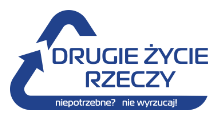 The "Second Life of Things" point is a place where residents can provide items (things) that are operable, undamaged, clean and do not pose a threat to future users. At the point, residents can leave, among others furniture, toys, prams, children's bicycles and ceramics. The company give the ability to reuse them by new owners.
The "Second Life of Things" point is a place where residents can provide items (things) that are operable, undamaged, clean and do not pose a threat to future users. At the point, residents can leave, among others furniture, toys, prams, children's bicycles and ceramics. The company give the ability to reuse them by new owners.
The point is located at the Selective Collection of Municipal Waste Point at ul. Wrzesińska 12 in Poznań.

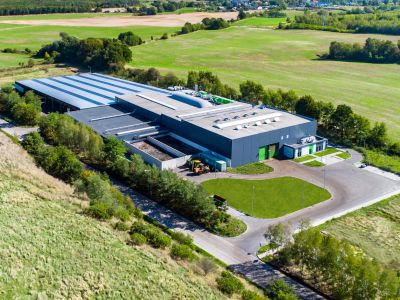 The installation for the recovery of biodegradable waste is located on the northern suburbs of Poznań next to the municipal waste landfill of the city of Poznań in Suchy Las.
The installation for the recovery of biodegradable waste is located on the northern suburbs of Poznań next to the municipal waste landfill of the city of Poznań in Suchy Las.
It is a key element (along with the Municipal Waste Thermal Conversion Installation) of the system that helps meet the obligation to recycle biodegradable waste.
It is a technical base providing the processing in the fermentation and composting process of selectively collected biodegradable waste, i.e. green waste from the green areas, gardens and parks, and kitchen waste.
The use of modern technology contributes to meeting the environmental protection standards in Region II. In addition, the technology allows for a high level of energy recovery from waste and the recycling of organic matter in a three-stage processing process. Besides, the processing of selectively collected biodegradable waste with the simultaneous acquisition of biogas allows to reduce the emission of methane and other greenhouse gases to the environment. The neutralization of biogas by combustion in power generators reduces the emission of sulfur dioxide and the emission of nitrogen oxides.
The technological processes taking place in the Installation are conducted in a closed hall. The fermentation and composting process takes place in closed, sealed chambers. In addition, the technological hall is equipped with a module for cleaning the air sucked in from inside the building, as a mechanical ventilation system directing the air to a two-stage cleaning process. After the composting process is completed, the finished product is subject to maturation, storage and packaging under the shelter.
Biodegradable waste, selectively collected by the inhabitants of the Poznań Agglomeration, is converted into electricity and heat as well as compost.
The investment was co-financed by the EU funds of the Operational Program "Infrastructure and Environment 2007-2013". Additional funds for the implementation of the investment included a loan from the National Fund for Environmental Protection and Water Management and a loan from the Provincial Fund for Environmental Protection and Water Management in Poznań.
More informations can be found at www.biokompostownia.pl

 The waste landfill in Suchy Las is defined as a landfill for non-hazardous and inert waste. The landfill is located within the administrative boundaries of the Suchy Las commune and the city of Poznań.
The waste landfill in Suchy Las is defined as a landfill for non-hazardous and inert waste. The landfill is located within the administrative boundaries of the Suchy Las commune and the city of Poznań.
Since 2016, the Municipal Waste Thermal Treatment Plant (ITPOK Incineration Plant) has been operating in Poznań, which, together with the change in the regulations on municipal waste management, contributed to the cessation of the storage of mixed municipal waste produced in households. Currently, the landfill recieves mixed construction waste, street and yard cleaning waste, and other waste not containing hazardous substances.
The total area of the land intended for the landfill is 57 ha.
The landfill facilities include:
- Waste storage quarters and reclaimed quarters
- unused and reclaimed landfill quarters (P-1, P-2)
- underreclamation (P-3)
- closed (S-1)
- during exploitation (S-2A)
- planned (S-2B)
- Control room building with a set of electronic scales.
- Office, social and workshop facilities
- Complex of facilities for degassing installations and energy and heat production - biogas heat and power plant with accompanying infrastructure
- Complex of facilities for purification of landfill leachate water with reservoirs and accompanying infrastructure
- Educational path
- Selective Collection of Municipal Waste point
- Yard for storing and dismantling bulky waste
- Automatic washing machine for wheels and car chassis
Additionally, in the immediate vicinity of the landfill, there is an installation for the recovery of biodegradable waste - Biocomposting Plant.
If you're not adept at writing your own essays, you can hire the services of an essayist who will write your essay on your behalf. An essay writing service has numerous advantages. In the first place, it can save you time, as well as modify and proofread your paper. It also can detect plagiarism, so that you don't duplicate writing from other writers. Additionally, it can help in locating the best essay writer through analyzing the work of past customers. You should choose a company that is respectful and will do not mistreat your work.
Potrzebujesz szybkiej pożyczki w Polsce? Oferujemy pożyczki na kwotę 200 złotych i więcej. Skorzystaj z naszych usług i zdobądź potrzebne środki już teraz. Pozyczka 200 zł - to rozwiązanie dla Ciebie!




